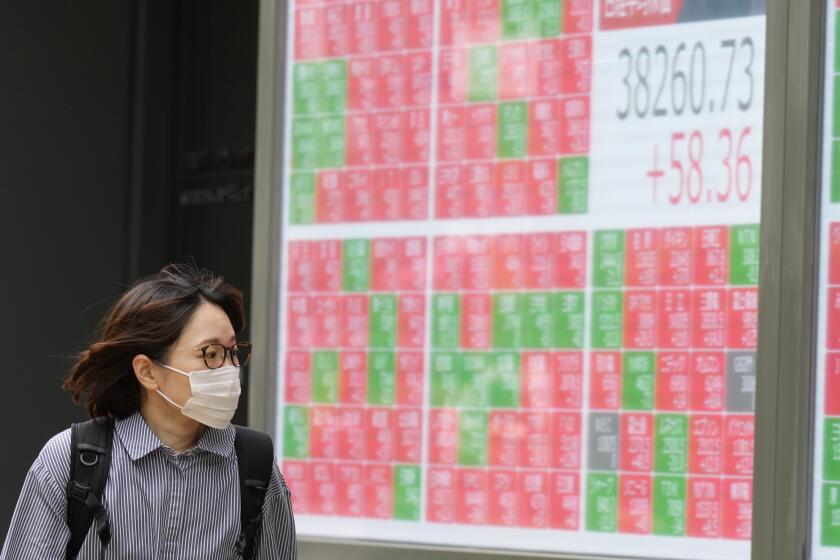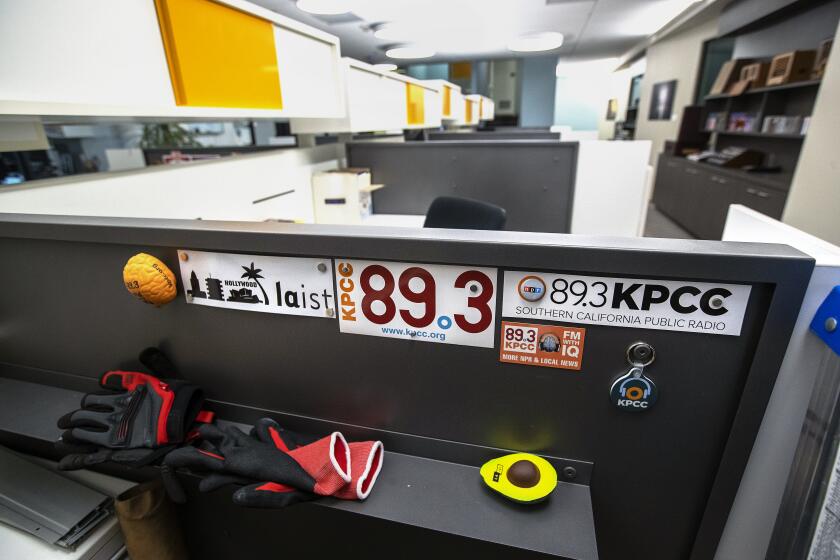SBA May Have Just the Deal You’re Looking for : Financing: Agency’s guarantees have enabled small commercial enterprises to obtain favorable real estate loans.
Forget most of what you’ve heard about the U.S. Small Business Administration and its loan program, say local lenders.
Borrowers looking for start-up capital or a loan without collateral need not apply. Borrowers turned down elsewhere for insufficient credit are out of luck too, they add.
But if it’s a commercial real estate loan you want, the SBA may have just the deal you’ve been looking for, said Sidney Moray, chief executive officer of Government Funding Corp., a private Hollywood-based lender that concentrates on disbursing SBA-backed loans.
Small commercial real estate loans are all but off limits to most troubled savings and loans and to banks accustomed to dealing exclusively with big accounts, Moray said.
That has left buyers of business properties with few options when it comes to financing $500,000 to $2 million deals. The few loans that are available often have to be paid back in less than 10 years and carry prohibitively high interest rates.
Through the SBA’s loan guarantee program, however, private lenders get up to $750,000 of their business loans backed by the U.S. government in case the borrower defaults.
These same lenders are also able to offer 25-year loans--with no balloon payments and with less than a month’s wait for approval--all at conventional loan rates. The result, said Moray, is that “we are swamped with requests for loans.”
Originally conceived as a federal program to bolster entrepreneurs, the SBA’s guarantee program has evolved into a massive commercial real estate lending operation.
The agency estimates that at least 35% of its $676 million in California loan guarantees last year went to finance real estate deals. Local lenders, however, report that 40% to 100% of their SBA-guaranteed loans are being disbursed for the purchase or development of commercial real estate.
After shopping several lenders for a $450,000 loan to finance the purchase of their Culver City automotive engineering facility, Richard and Willy Guldstrand decided to try getting an SBA loan through private lender Government Funding Corp. of Hollywood.
Main-line lenders “didn’t want to touch our loan application,” said Willy Guldstrand. But with an SBA loan guarantee, she said, “we had no problems.”
“The banks were much harder to deal with,” reported borrower Agapito Cordero Jr. He and his family borrowed $480,000 to finance the purchase of their automobile body shop in La Puente.
“The commercial loan was more expensive,” he said, because lenders didn’t want to spread his payments over 25 years. The SBA-guarantee program made it possible to get a long-term loan, however. For Cordero, buying his own business “was an All-American dream.”
By hooking up with the SBA, “we’ve been able to help customers we couldn’t otherwise make a loan to,” said Jim Whitney, senior vice president at American Pacific State Bank in Sherman Oaks. That’s why, he reasoned, “the SBA program is becoming a more frequently used method for real estate financing.”
At American Pacific, he said, more than half of his SBA loan disbursements go to finance the purchase of commercial real estate.
The bank prefers such loans, he said, because they carry the backing of the federal government and allow the bank to be more flexible in some of the terms it offers to qualified borrowers.
In the future, he predicts, many lenders will compete to become SBA lenders--especially as a secondary market develops among investors interested in buying whole SBA-backed loan portfolios on Wall Street.
New underwriting requirements have also prohibited many lenders from making what can often be very profitable small business and real estate loans. The SBA’s backing, however, can make these loans pass regulatory muster.
Such loans are not available to everyone. Only about one out of every 20 interested borrowers actually qualifies. Further, the property being bought or developed must be used as the buyer’s place of business. Most important, say lenders, is that the borrower exhibit a healthy cash flow and bottom line.
“What we look for first is management,” said Jerry Morita, an executive at Mechanics National Bank in Paramount. “We view it primarily as a business loan, not as a real estate loan.”
Morita estimated that 30% of his bank’s SBA-backed loans are being used for real estate. And, he expects such loans to become more common. Most banks don’t make long-term commercial real estate loans anymore, he said, so “the SBA program is becoming more and more competitive.” In essence, he said, “it provides a cushion to stretch out payments.”
This cushion, added Government Funding’s Moray, makes SBA-guaranteed loans “the most attractive game in town.” In fact, his company did nothing but SBA-backed loans last year, racking up a loan volume of $59 million in California--and making his company No. 1 in SBA lending state-wide.
What most prospective borrowers don’t understand, he added, is that the reality of SBA loans today has little to do with what the program was like just a few years ago.
Gone are most loans directly from the government and incentives for lending to women and minorities. Gone too are the days of risky loans that created an astronomical default rate in the 1970s. Borrowers, Moray said, qualify purely on the basis of their financial ability--nothing more and nothing less.
If all the numbers add up to the borrower’s favor, Moray said, loan approval can be a very quick process. The SBA can provide borrowers with a list of so-called preferred lenders that are authorized to approve a loan without first passing the paper work to the SBA.
And so-called certified lenders need only pass a loan application to the SBA for a cursory glance. In some cases, Moray said, he can process a loan and cut a check within seven days.
SALES Business Park Planned in Santa Fe Springs McGranahan Carlson & Co. is planning a $120-million business park on 102 acres it bought late last year in Santa Fe Springs. The Culver City-based developer bought the site from a subsidiary of Santa Fe Railroad and has named its project MC&C; Commerce Center II. Located near the junction of the Santa Ana (5) and San Gabriel (605) freeways, this master-planned office and industrial development is less than 1 mile from the company’s 185,000-square-foot MC&C; Commerce Center I, completed in 1988.
Work is already under way to prepare a 15-acre portion of the newly acquired site for the project’s first phase, offering a total of 300,000 square feet. McGranahan Carlson and joint-venture partner Old Stone Development Corp. of Providence, R.I. plan a total of 1.5 million square feet of commercial development at the new center.
Trizec Properties Inc. finally closed escrow on its purchase of about 22 acres of Warner Center property from Dataproducts Corp. Calgary. Canada-based Trizec has been trying to buy the two parcels along Erwin Street for nearly a year.
When the printer company rebuffed its first offer, Trizec cut a deal to buy the properties for $57 million from DPC Acquisition Partners, a group of dissident Dataproducts shareholders that made several unsuccessful attempts last year at an unfriendly takeover. When that strategy didn’t work, Trizec returned to Dataproducts with a new offer for $63 million last fall.
Since then, buyer and seller have been haggling over the details. The closing price, reported Trizec broker Julien J. Studley Inc., was $59.5 million, giving Trizec a $3.5-million discount on its offer to make up for recently discovered “environmental” problems that need to be remedied at the sites.
Not one to rest on its laurels, Trizec is considering plans to develop the properties after Dataproducts moves out in two years and also is entertaining offers to sell out. One such offer may be forthcoming from billionaire Marvin Davis who has expressed an interest in buying at least part of the property for a new Sports Club L.A. in the west San Fernando Valley.
Leed Properties of Beverly Hills is developing 18.5 acres of Chino property into a $40-million distribution complex at Chino Industrial Park. Oltmans Construction Co. of Whittier has initiated work on five buildings that will provide nearly 800,000 square feet of space.
Trammell Crow Co. has added to its land holdings in Santa Fe Springs with the acquisition of 32 acres fronting Norwalk Boulevard in Santa Fe Springs. The site will be combined with an 18-acre parcel the company already owns to create The Colonnade, an office and industrial center totaling up to 900,000 square feet of development.
Swede-Cal Properties Inc. paid $15.3 million for the Anaheim Corporate Center, totaling 158,149 square feet of office and R&D; space on 9.3 acres. Tenants at the project’s four buildings include Control Data and R.J. Reynolds.
Galperin is a Los Angeles-based free-lance writer who has covered the commercial real estate scene for several years. News releases and column inquiries should be mailed to 8306 Wilshire Blvd., No. 7078, Beverly Hills, Calif. 90211.






